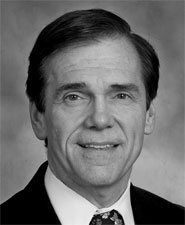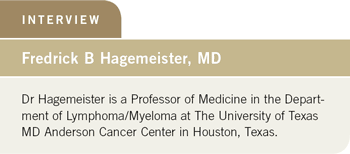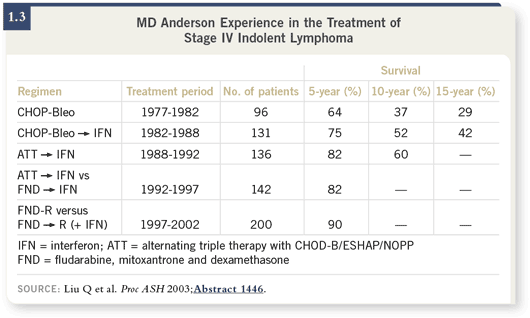You are here: Home: NHLU 5 2005 : Fredrick B Hagemeister, MD
 |
 |
| CD 1 - Tracks 2-15 |
| Track 2 |
Case discussion: A 79-year-old
man with massive orbitosinus
diffuse large B-cell lymphoma |
| Track 3 |
Clinical use of R-Hyper-CVAD for
a patient with high-risk diffuse
large B-cell lymphoma |
| Track 4 |
German study evaluating
R-CHOP-14 versus R-CHOP-21
in elderly patients |
| Track 5 |
Complete remission of high-risk
diffuse large B-cell lymphoma to
R-Hyper-CVAD |
| Track 6 |
Use of PET scan results to tailor
treatment decision-making |
| Track 7 |
Case discussion: Patient with
follicle center-cell lymphoma and
clinical depression |
| Track 8 |
ECOG-E4402: Rituximab
Extended Schedule Or Re-Treatment
(RESORT) trial |
|
| Track 9 |
Responsiveness to chemotherapy
after development of resistance
to rituximab |
| Track 10 |
Nonprotocol use of maintenance
rituximab |
| Track 11 |
PRIMA study: Maintenance
versus no maintenance rituximab
after response with chemotherapy-
R in advanced follicular
lymphoma |
| Track 12 |
Improvement in complete
response rates with the combination
of GM-CSF plus rituximab |
| Track 13 |
Complete remission to R-FND
after progression on rituximab |
| Track 14 |
Potential curability of patients
with indolent lymphoma |
| Track 15 |
Clinical experience with
R-FND therapy |
|
|
Select Excerpts from the Interview*
 CD 1, Track 8 CD 1, Track 8
  DR LOVE: I’m curious about your thoughts on the RESORT trial
comparing R followed by R maintenance versus R alone and R re-treatment
on progression. I find it interesting that maintenance therapy is
given indefinitely, as opposed to being given for two years. DR LOVE: I’m curious about your thoughts on the RESORT trial
comparing R followed by R maintenance versus R alone and R re-treatment
on progression. I find it interesting that maintenance therapy is
given indefinitely, as opposed to being given for two years. |
  DR HAGEMEISTER: I love the maintenance program in this study — it’s based
on real data from the Gordon trial. I like the idea, ultimately, of giving the
rituximab as maintenance, until the patient develops disease progression. DR HAGEMEISTER: I love the maintenance program in this study — it’s based
on real data from the Gordon trial. I like the idea, ultimately, of giving the
rituximab as maintenance, until the patient develops disease progression.

This is a very interesting study (1.1); however, I would love to see an
additional question addressed, and that is, Will patients who subsequently are
treated with chemotherapy — or whatever additional therapy they receive
when they develop progressive disease — will patients on both arms have the
same responsiveness to chemotherapy? There is a suggestion that patients who
are “refractory” to rituximab tend to be resistant to chemotherapy agents.
However, there are no clinical data to support that. In fact, patients seem to
have more favorable disease at the time of recurrence and survive for longer
periods of time, it appears, when they receive rituximab as therapy. Although
there’s no real hard, strong data right now in a randomized study to demonstrate
that, there is a strong suggestion that patients are living longer because
they receive rituximab.
The Hainsworth study of R maintenance is in patients with relapsed
lymphomas, not front-line therapy. With these patients, time to treatment
failure is better when you give maintenance rituximab, but time to receiving
other drugs or a new treatment is no different whether you adopt a maintenance
therapy or a re-treatment therapy.
What will ultimately answer this question is the PRIMA study, which evaluates
R-chemotherapy followed by rituximab maintenance every three months
for two years versus none (1.2). In that trial, it may be that rituximab maintenance
actually ends up prolonging the patient’s time to treatment failure
— but maybe not survival.

 CD 1, Track 12 CD 1, Track 12
 DR LOVE: Would you provide an update of your study of rituximab
plus GM-CSF? DR LOVE: Would you provide an update of your study of rituximab
plus GM-CSF? |
 DR HAGEMEISTER: We’ve been conducting a study that shows that administering
GM-CSF along with rituximab leads to much higher complete response
rates than we see with single-agent rituximab. It was not a randomized study,
and it wasn’t in patients who were rituximab resistant. In fact, patients had
to have sensitive disease. They had to have a response to their last rituximab
treatment that lasted at least six months in order to be entered on the study. DR HAGEMEISTER: We’ve been conducting a study that shows that administering
GM-CSF along with rituximab leads to much higher complete response
rates than we see with single-agent rituximab. It was not a randomized study,
and it wasn’t in patients who were rituximab resistant. In fact, patients had
to have sensitive disease. They had to have a response to their last rituximab
treatment that lasted at least six months in order to be entered on the study.
Recently, Peter McLaughlin presented our data at the lymphoma meeting
in Lugano, Switzerland. The complete response rates are in the range of 40
percent. They’re very dramatic. We’ve treated approximately 75 patients, and
the side effects have not been any more than what you would expect with
rituximab as a single agent.
Patients didn’t receive maintenance therapy on the trial. The most interesting
aspect of that whole study is that we actually demonstrated that ADCC
(antibody-dependent cellular cytotoxicity) is upregulated by the administration
of GM-CSF.
We’re currently considering this as a new study — a Phase II/III study with
rituximab/GM-CSF in patients with indolent follicular lymphoma who
have zero to one adverse feature in the Follicular Lymphoma International
Prognostic Index (FLIPI) score.
 CD 1, Track 14 CD 1, Track 14
 DR LOVE: Fernando Cabanillas has discussed the concept of cure, or
extended survival, in patients treated for indolent lymphoma, and the
series of trials that have been done at MD Anderson (1.3). What are your
thoughts on that? DR LOVE: Fernando Cabanillas has discussed the concept of cure, or
extended survival, in patients treated for indolent lymphoma, and the
series of trials that have been done at MD Anderson (1.3). What are your
thoughts on that? |
 DR HAGEMEISTER: We’ve demonstrated in sequential trials that survival
appears to have improved continuously over the last 30 years, first with CHOP
alone or CHOP-Bleo initially, then with CHOP/interferon and, ultimately,
with alternating triple therapy plus interferon. Then, when we introduced
FND, things also significantly improved, and finally, with the addition of
rituximab in the last five years — more than 90 percent of those patients are
still alive at five years with R-FND-type therapies (Liu 2003). DR HAGEMEISTER: We’ve demonstrated in sequential trials that survival
appears to have improved continuously over the last 30 years, first with CHOP
alone or CHOP-Bleo initially, then with CHOP/interferon and, ultimately,
with alternating triple therapy plus interferon. Then, when we introduced
FND, things also significantly improved, and finally, with the addition of
rituximab in the last five years — more than 90 percent of those patients are
still alive at five years with R-FND-type therapies (Liu 2003).

 DR LOVE: Fernando talked about a plateau in the curves at eight years. What
are your thoughts on that? DR LOVE: Fernando talked about a plateau in the curves at eight years. What
are your thoughts on that?
 DR HAGEMEISTER: We’ve evaluated patients who have Stage IV follicular
lymphoma who were all submitted for the FLIPI analysis. Every patient had
Stage IV disease and had been treated on a trial. DR HAGEMEISTER: We’ve evaluated patients who have Stage IV follicular
lymphoma who were all submitted for the FLIPI analysis. Every patient had
Stage IV disease and had been treated on a trial.
We looked at time to progression and after about nine or 10 years, approximately
40 percent of the patients who have a low beta globulin serum tumor
marker have not developed progressive disease, and there is very definitely a
plateau out to 15 years.
Select publications
* Conducted on August 10, 2005
|

